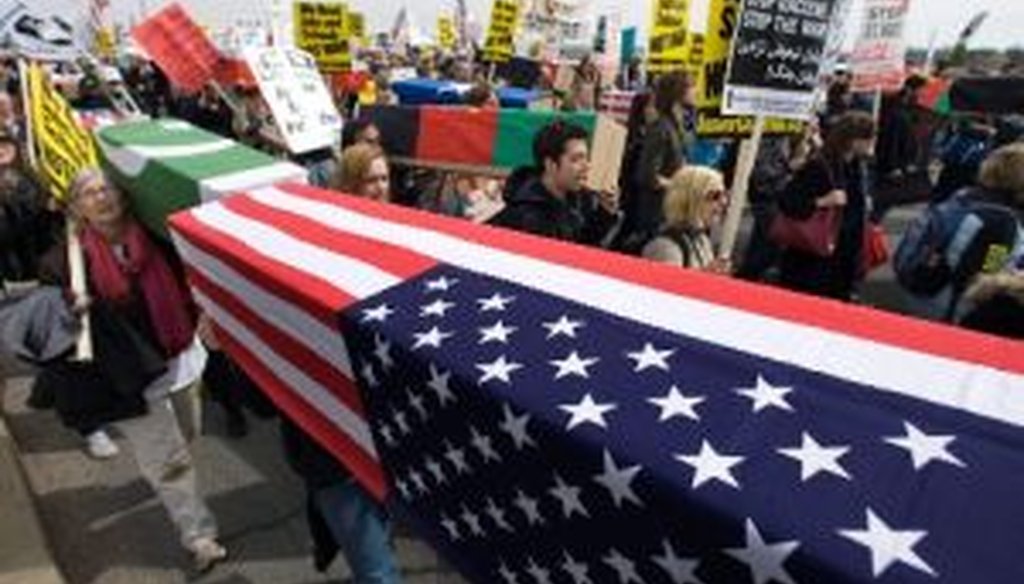



Anti-war protesters carry mock coffins draped in American flags during a march to the Pentagon on March 21, 2009, marking the sixth anniversary of start of the war in Iraq.
In her recently published memoir Hard Choices, Hillary Clinton acknowledges that "she got it wrong" when she voted to authorize the Iraq War in 2003. As Iraq once again becomes a big news story, as Islamic militants take over large portions of the country’s north and threaten the capital in Baghdad, we thought it would be worth checking one of Clinton’s claims about the American public’s perceptions of the Iraq War.
In the seventh chapter of her memoir, Clinton writes that, "by 2006, the American people were overwhelmingly against the Iraq war."
Is that correct? We looked at polling data about the war between 2003 and 2006, archived at PollingReport.com. (Here are the ones that fit the criteria for this fact-check.)
Initially, Americans felt favorably about the war. While the wording changes somewhat from poll to poll, the level of support for the war was usually at or above two-thirds in mid- March 2003, right before the war began. That month, support hit 70 percent in a Newsweek poll, 64 percent in a CNN/USA Today/Gallup poll, 65 percent in an NBC News/Wall Street Journal poll and 71 percent in an ABC News/Washington Post poll.
In the first few weeks after the attack was launched, support levels went as high as 77 percent in CBS News and Los Angeles Times polls, 78 percent in an ABC News/Washington Post poll and 81 percent in a Fox News poll.
However, as the war continued, support began to soften. Eventually, support turned negative in some polls.
By mid-May 2004 -- a little over a year after the start of the war -- Time and CNN asked, "Do you approve or disapprove of the way George W. Bush is handling the situation in Iraq?" and found 44 percent approval and 51 percent disapproval. The numbers were similar when the pollsters asked, "In general, do you approve or disapprove of current military policy in Iraq?"
Even the Fox News/Opinion Dynamics poll -- which as late as June 2004 found support at 60 percent -- found by February 2005 that a plurality of respondents, 49 percent, said going to war was the "wrong thing" to have done, compared to 46 percent who said it was the "right thing."
Disapproval of Bush’s handling of the war reached 58 percent in August 2005 in an Associated Press/Ipsos poll, and it remained roughly the same in a CNN/USA Today/Gallup poll in February 2006 and a CNN poll in May 2006.
Finally, in the second half of 2006, opposition the war began to hit 2-to-1 margins over support for the war.
In July 2006, when CBS and the New York Times asked, "Do you think the result of the war with Iraq was worth the loss of American life and other costs of attacking Iraq, or not?" 63 percent said it was not worth it, compared to just 30 percent who said it was worth it. Then, in November 2006, Time asked about approval of Bush’s handling of Iraq and found 65 percent disapproval and only 31 percent approval.
Disapproval continued to rise slightly into 2007. AP found 68 percent disapproval of Bush’s handling of Iraq in January 2007, and CNN/Opinion Research Corporation found 69 percent.
So the polling generally tracks with time timeline Clinton offered. The only question is whether disapproval rates in the low-to-mid 60 percent range qualifies as "overwhelming." We were a little skeptical, so we asked some polling experts.
"That is an awfully subjective call," said Charles Franklin, director of the Marquette Law School Poll and co-founder of Pollster.com. "I’d be surprised if there were any consensus where that line falls."
Mark Blumenthal, the senior polling editor of the Huffington Post and the founding editor of Pollster.com, said the use of "overwhelming" strikes him as subjective, and depends on the context. "What seems like an 'overwhelming' victory margin in a competitive electoral contest might not seem quite as 'overwhelming' in the context of attitudes about a particular policy issue," he said. "I’d guess I’d be OK with 2-to-1 for the former, but 3-to-1 or 4-to-1 for the latter."
Tommy Vietor, a spokesman for Clinton, emailed us to say, "In public opinion, if you’re talking about 50-percent-plus opposition on an issue, I think most people would call that ‘overwhelming.’" Vietor added that "the 2006 elections, which went massively in the Democrats’ favor, were viewed as a response to the war."
Our ruling
Clinton said that, "by 2006, the American people were overwhelmingly against the Iraq war." Polling data shows that roughly 65 percent of the public opposed the war by the second half of 2006, but while that qualifies as strong opposition, the definition of "overwhelming" within the polling profession is more uncertain. On balance, we rate Clinton’s claim Mostly True.
UPDATE, June 20, 2014, 11:45 am: This article has been updated to include a response from Clinton's staff received after the story was published.
Hillary Clinton, Hard Choices
PollingReport.com, Iraq, accessed June 10, 2014
Email interview with Charles Franklin, director of the Marquette Law School Poll and co-founder of Pollster.com, June 19, 2014
Email interview with Mark Blumenthal, senior polling editor of the Huffington Post and the founding editor of Pollster.com, June 20, 2014
Email interview with Tommy Vietor, press aide to Hillary Clinton, June 20, 2014
In a world of wild talk and fake news, help us stand up for the facts.
